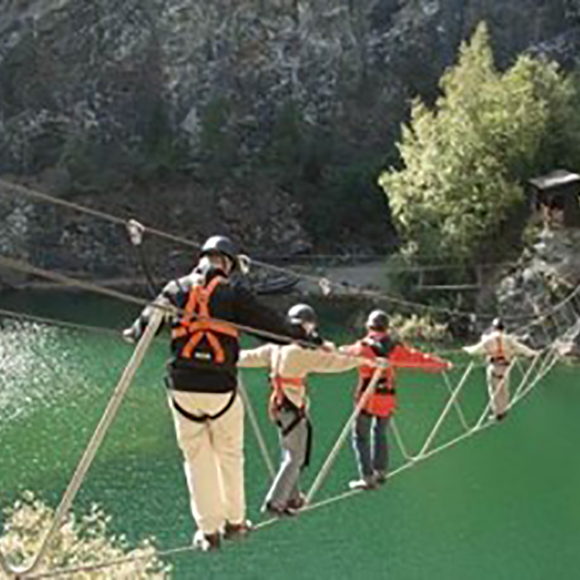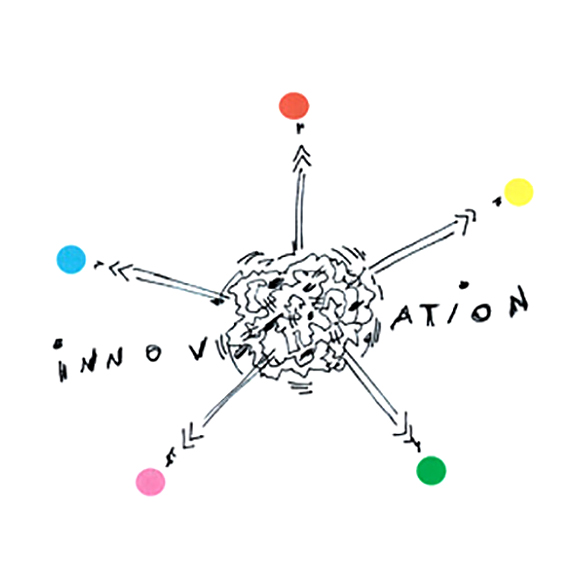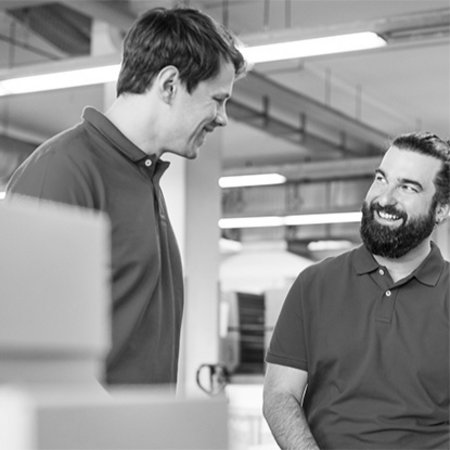Methods
Change management always includes diverse options for action and requires flexible methods. Due to our many years of experience, our personal toolkit is well-filled. Approaches and methods may either be complex or very simple and pragmatic. Here’s a look at our change tools.
Based on the model of transactional leadership, we strengthen the ability of leaders to credibly perform their roles within the organisation. This is about understanding the importance and responsibilities in the VUCA world (volatility, uncertainity,complexity,ambiguity) and to position and to develop themselves in the context of these demands. During the process of reflecting, leaders will learn what matters most. They’ll learn to inspire others, be credible role models and enable their team members to perform the tasks at hand. The ‘flight level’ of this examination extends from reflecting one’s own attitude to the development of a personal leadership style through to trying out various settings for employee performance reviews. Naturally, in designing the training concept, we will integrate the specific tasks of our clients to deliver effective solutions and benefits.
Services are complex processes affected by various success factors. Service orientation is a fundamental attitude that must be equally ingrained in the organisation and its employees. To build this mind-set, our ‘Living the service experience’ workshop reflects on the personal experiences and individual attitudes of leaders and team members. The workshop is focused on training the participants to rigorously shift their thinking to the customer’s perspective and to translate this shift into consistent service behaviours.
The energy of large groups can unleash major opportunities. Moreover, the exchange between diverse stakeholders and bringing together a wide range of views are key elements of successful change processes. That’s why connecting people within organisations is very important. Leaders desiring to activate large numbers of people both physically and mentally can choose from an extensive portfolio of established large-scale formats. They’re characterised by agility and dynamism, are interactive and aligned with clearly defined goals. They offer new experiences, are usually great fun as well, and provide practical tips for effectively transferring new ideas and insights into everyday working life.
Due to customized preparation and follow-up, large-scale events with up to several hundred attendees provide valuable impetus to the continuing change process. Be it Open Space, World Café, Customer Parliament formats or elements of experiential education, they’re all centred on new experiences, enjoyment of fresh inspirations and effective transfer to daily work life. As experienced event managers, in addition to designing and facilitating, we’ll be pleased to take care of the practical planning, organisation and execution of such events.
The ways in which organisations work (together) are in the process of fundamental transformation. New forms of work require new frameworks. The future of work has many faces, so it’s all the more important to identify the form that best fits the respective set of tasks.
Be it open space, telecommuting or other work scenarios that depict the diversity of demands made on the work environment: a generally positive spirit and open-mindedness within the organisation are key prerequisites for implementing these working words.
Our team strategy workshop provides room for developing the organisational conditions for successful new-work settings. The strategy development process that takes place during these workshops helps to shape viable interactions, integrate diverse views and demand-based aspects and to thus enhance – or at least maintain – the capabilities of a team.
Sometimes it takes a different type of setting or form of gathering to ‘grasp’ complex contexts, adopt and ‘translate’ new stimuli and to thus find new opportunities for action in the daily work environment. That’s why we offer special workshops that are highly oriented to practical aspects and experience. Many of them are characterised by a choice of unusual learning locations, from ‘new working worlds’ through to mountain lakes or other exceptional places in unique natural surroundings. The design of these formats is always based on the specific challenges faced by our clients. Using a diversity of methods, we ensure a sustainable transfer of the experiences gained into the daily work life of the participants.

Conflicts are the constant companions of change. If dealt with constructively, conflict potential promotes development. Unclear objectives and lack of communication frequently lead to major misunderstandings, and different views of what the best course of action would be often causes considerable friction as well. These conflict scenarios need to be perceived and dealt with: intensively addressing diverse perspectives creates new clarity and offers opportunities for viable change.
In the event that the dialogue has stalled, professional mediation can help to put it back on track. As experienced mediators we provide multi-partial and highly professional assistance to the communication process of the conflicting parties. Together, we look for ways in which to combine the interests of people and the organisation and to foster a development that comes close to the ‘best-of-all’ philosophy, with a special focus on the future collaboration of the stakeholders.
The fast pace of day-to-day business poses one of the great risks to change. In view of the daily challenges to be mastered it’s important to remember learnings and to find pragmatic approaches that enable new routines. To support this, we’ve developed specific tools for the daily work of leaders and teams. They serve as ‘friendly reminders’ and as ‘hands-on’ assistance in handling day-to-day operations as well as provide impetus for future collaboration.
Our Discussion Guide, for instance, assists stakeholders in their communication in moving away from ‘positions’ towards ‘shared interests’. This handy flyer is used as a pragmatic and useful tool in many organisational communication settings.
In addition to staying power, cultural development calls for stimuli and supporters on many levels. Leaders and internal experts highly benefit from team members who embrace change and live the will to change as role models early on. Such intra-organisational change agents help to point the way towards achieving a cultural goal, support the transformation processes through communication, strengthen change by taking action and motivate others to join in. Our programme to develop a pool of change agents effectively complements the cultural evolution of an organisation.
With its origins in software development, Scrum as a method for agile project management provides an effective approach to development processes in organisations. Scrum is characterised by iterations, so-called sprints, jointly agreed quality criteria, clear distribution of roles, precisely defined responsibilities and high performance. High stability, logic and efficiency are hallmarks of the process. Together with our clients, we check what elements of Scrum may be adaptable to and useful for the existing organisational structures.

As a tool for exchange, networking and cultural work the Bar Camp open-space format provides a platform for its stakeholders to act from within. Due to its open concept, this event setting operates as a space in which participants contribute their expert knowledge and their questions. With no limit on the number of people involved, the format offers an opportunity to develop and work on topics from within the group in a response-driven process. Instead of a set agenda, the participants develop sessions on topics they then run on their own. In transformation processes, the dynamic setting provides a clear internal view of an organisation and some initial pointers for the next meaningful moves.
Unwillingness to share information and a silo mentality jeopardise the future. The paradigm shift from knowledge gathering to knowledge sharing counteracts this risk: people who make their work visible in fast-paced cross-functional exchange, readily share their expertise and knowledge and help others to develop as well are key players.
The WOL principles are based on relationships, generosity, visible work, goal-driven behaviours and growth-oriented thinking. A structured programme helps the participants to part with old habits in favour of these new principles. In doing so, they help to transform the organisation -- and personally benefit as well.
WOL pursues the transparent, open collaboration within networks and is a key skill for the connected working world. We support the implementation of WOL and are a sparring partner in dealing with issues that reside in other areas of the organisation.
Introducing game design elements into non-game contexts can serve as a gateway to further development in many change situations. Experience-based points, high scores, rankings, virtual goods or individual awards provide incentives for intensively dealing with game contents. Properly used, game design elements are able to positively drive change. Gamification often follows the idea of strategy games that split a challenge into many smaller levels and celebrate every success. In this way, fun becomes a synonym for learning. Together with our clients, we develop gamification approaches – both in terms of tangible materials and games in the virtual world.
Facets of change

BE THE CHANGE THAT YOU WANT TO SEE IN THE WORLD
Mahatma Gandhi







